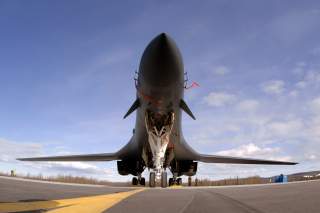Bomber Battle Royal: America's B-1 vs. Russia's Deadly Tu-160
Who wins?
The Tu-160--while it looks similar to the B-1B--is a very different aircraft. The Soviet Union designed the Blackjack primarily as a means to deliver a nuclear strike during World War Three. However, the Soviets designed the jet mainly as a means to deliver nuclear-tipped cruise missiles--though the aircraft retained the ability to do low-level penetration. As such, the Tu-160 is much larger and much faster than the B-1B--with a maximum takeoff weight of over 606,000lbs and top speed greater than Mach 2.05. By contrast, the B-1B weighs in at 477,000lbs.
The Rockwell International B-1B Lancer strategic bomber and the Russian Tu-160 Blackjack look visually similar and even share some overlap in their mission sets, however, the two aircraft are quite different.
The B-1A was originally designed as a high-altitude supersonic penetrator before the Carter administration cancelled the program in 1977 after it became apparent that the new bomber would not be able to survive against new Soviet air defenses. Instead, the Carter Adminstration emphasized ballistic missiles and authorized the development of what would eventually become the Northrop Grumman B-2A Spirit stealth bomber. However, the development of the stealth bomber was not made public and would remain classified for years to come.
President Ronald Reagan resurrected the supersonic bomber as the B-1B. Instead of penetrating at high altitude, the new B-1B would be optimized for low altitude penetration using a combination of speed, terrain masking and reduced radar cross section. However, the tradeoff was that the B-1B sacrificed high-altitude, high speed performance as a result. While the B-1A had a top speed of over Mach 2.0, but the B-1B can barely manage Mach 1.25 as a result of its many structural changes and fixed geometry inlets.
After the end of the Cold War, the B-1B was denuclearized and refocused on the conventional role with all of the jet’s nuclear hardware being removed in 1995. In place of the nuclear capability, the bomber was given a new conventional role starting with Conventional Mission Upgrade Program. As part of the effort, the bomber was fitted with enhanced synthetic aperture radar capability and the ability to carry precision-guided munitions. In the intervening years since Sept. 11, 2001, the bomber has been upgraded with new sensors like the Sniper XR targeting pod and data-links to better enable to jet to perform missions for America’s counterinsurgency wars in Iraq and Afghanistan.
The B-1B is no longer able to fight inside heavily defended airspace, but the aircraft will still have a role in the high-end fight as a standoff cruise missile carrier--using weapons like the JASSM-ER and LRASM. Ironically, that means that during a high-end fight it will have a role similar to the Russian Tu-160.
The Tu-160--while it looks similar to the B-1B--is a very different aircraft. The Soviet Union designed the Blackjack primarily as a means to deliver a nuclear strike during World War Three. However, the Soviets designed the jet mainly as a means to deliver nuclear-tipped cruise missiles--though the aircraft retained the ability to do low-level penetration. As such, the Tu-160 is much larger and much faster than the B-1B--with a maximum takeoff weight of over 606,000lbs and top speed greater than Mach 2.05. By contrast, the B-1B weighs in at 477,000lbs.
The Tu-160s primary armament has always been long-range cruise missiles like the Kh-55MS--of which it can carry a dozen. In recent months however, the Russians have used the conventional version Kh-555 version of the cruise missile against targets in Syria alongside much more advanced and stealthy Kh-101 cruise missile. The aircraft also carries the nuclear-tipped Kh-102.
In the near future, the Russians hope to restart production of the much improved Tu-160M2 version of the Blackjack. The new jets will replace Russia’s existing Tu-22M Backfires and Tu-95 Bear bombers while supplementing the existing Tu-160 fleet. The improved aircraft will is a stopgap until Russia can complete development of the new PAK-DA stealth bomber.
So, in fact, it’s not a question if the B-1B or Tu-160 is better--different planes have different roles and missions.
Dave Majumdar is the defense editor for The National Interest. You can follow him on Twitter: @davemajumdar.
This first appeared last year.

